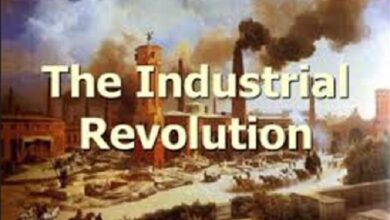Industrial Revolution definition/concept
The Industrial Revolution is a process started in Great Britain around the year 1730, which encompasses the various changes in the model of production and consumption of goods, completely transforming the economic life of the moment, going from an agricultural society to an industrialized society and originating major political and social changes. Industrial Revolution definition
During the nineteenth century, these changes were extended to many countries in Western Europe and also in North America, completing the entire process between 1820 and 1840.
Causes of the Industrial Revolution
The Industrial Revolution appears as a set of factors that have their origins in various fields of society, but which interrelate with each other. Thus, among its main causes, it is worth highlighting the following: Industrial Revolution definition
One of the fundamental elements to understand the Industrial Revolution is the adoption of steam as an energy source . Technological advances made it possible to replace animal traction with machines that worked on coal and which gave much higher yields, in addition to establishing a revolution in the transport sector with the emergence of the train, giving greater speed of movement little imagined in times past. Industrial Revolution definition
Enhance your reading: What is Treaty of Bucareli definition/concept
In the area of demography, the years prior to the Industrial Revolution coincided with population growth , mainly derived from the increase in life expectancy thanks to the incorporation of new hygienic, sanitary and food measures. Industrial Revolution definition
The demographic increase arose from a rural exodus that moved the population from agricultural areas to cities, which resulted in an increase in the supply of cheap labor instead of the demand for basic goods.
Technological advances allowed the Industrial Revolution to also mean an Agricultural Revolution
Income from the primary sector has multiplied progressively thanks to the adoption of new cultivation techniques and the replacement of fallow by rotation, as well as the adoption of new crops such as corn and stabled cattle, thus allowing the use of new methods of production that led to the emergence of the first agricultural entrepreneurs. This fact also reflected negatively, as this concentration harmed small farmers by expelling them from their land and taking them to the city . Industrial Revolution definition
Enhance your reading: Greek gods and goddesses names
The conclusion was that society has completely changed. The class division that was unattainable until the mid-eighteenth century was replaced by a society divided into three classes (upper, middle and lower) allowing for some mobility between them, although their living conditions remain strongly marked.
